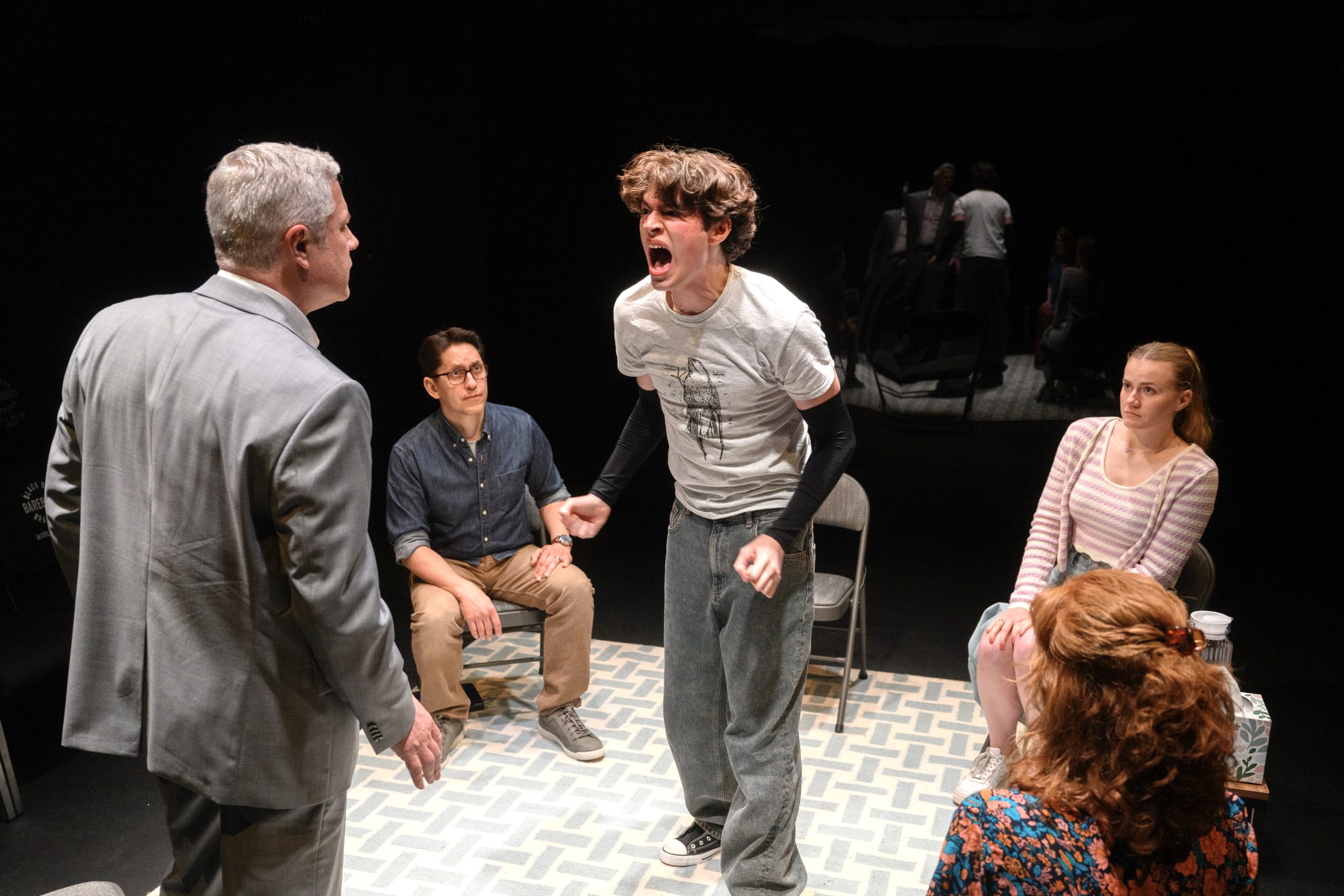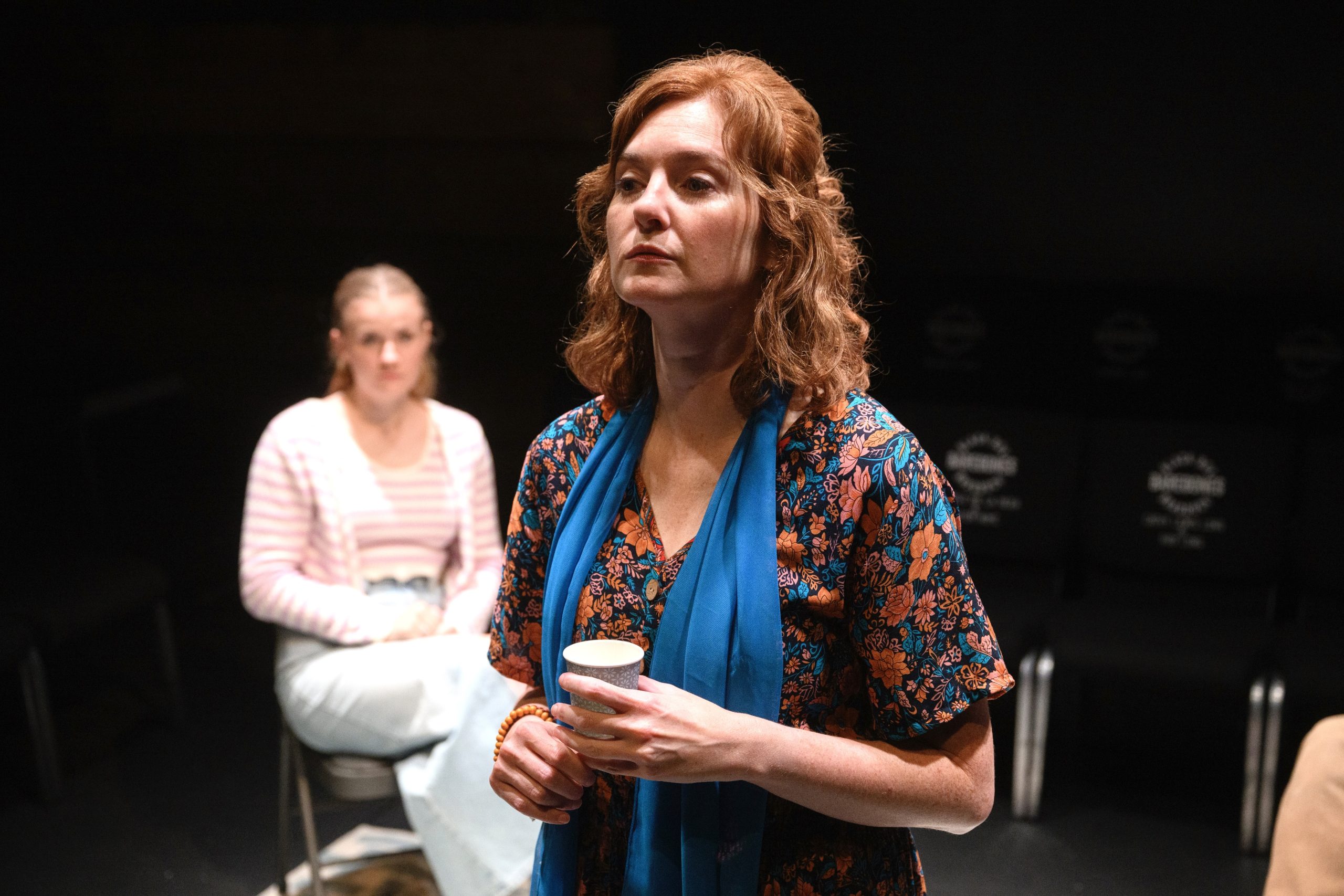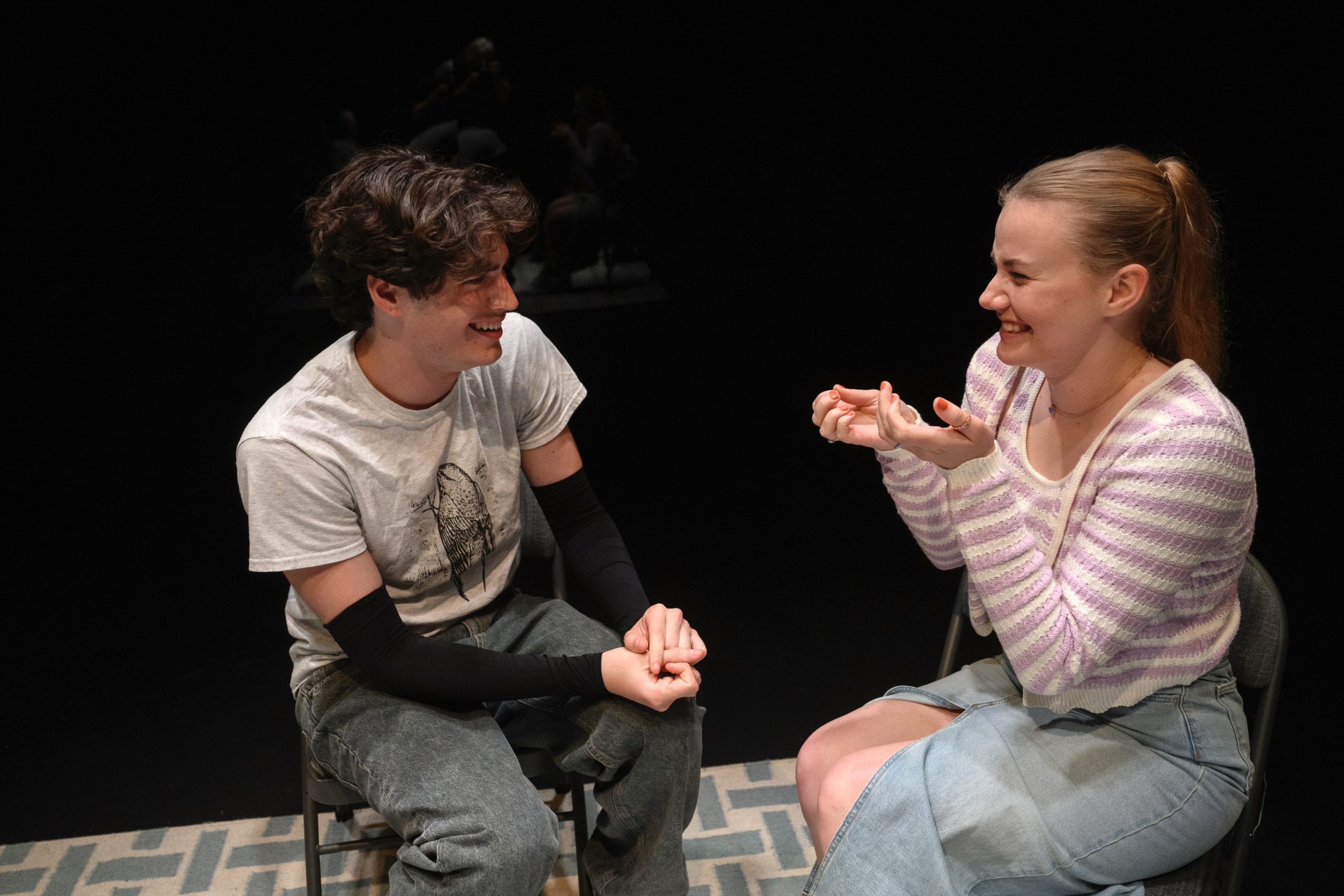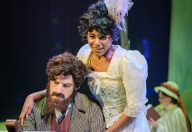Human Nature, Red in Tooth and Claw: ‘The Animal Kingdom’ at Barebones

Prodigal son lashes out prodigiously: Sam (Greyson Taylor) has had it with Dad (Darren Eliker, L). The hands-off referee is therapist Daniel (Juan Rivera Lebron); the spectators are Sam’s sister (Alexandra Casey) and mother (Daina Michelle Griffith, showing red hair).
An emerging trend in British theater has now reached Pittsburgh. Last year, the London magazine The Stage remarked that audiences there are seeing a wave of new plays about mental health and psychotherapy, with therapy sessions enacted onstage. A play that’s a strong representative of the wave—The Animal Kingdom, by theater artist and BBC screenwriter Ruby Thomas—is being presented in our area by barebones productions, through June 30.
In a sense, therapy plays are the modern equivalent of courtroom dramas. You have characters facing off in a tight, tension-filled space. There are mysteries to be solved—with therapy, not whodunit, but rather what’s going wrong deep in people’s psyches, and whether it can be addressed. Done well, the result is good theater.
And we can’t ignore the fact that plays of this kind are also timely. In the United States as in England, mental illness seems to be on the rise at a shocking rate. This is attributed partly to the recent traumas of the Covid pandemic. But a troubling surge that began well before Covid has continued: an increase of serious mental disorders among teenagers and young adults. Which is the type of case played out fictionally in The Animal Kingdom.
Creatures in a Cage Match
At barebones, the lights come up on a simple set of folding chairs arranged in a circle. Standing at the center and conversing, in a let’s-relax-before-it-gets-tense way, are the young therapist Daniel (played by Juan Rivera Lebron) and his younger charge, a twitchy teen named Sam (Greyson Taylor). Sam has been an inpatient of a psychiatric ward for weeks, ever since a severe break at college led to his blowing off final exams and needing intensive care.
Sam wears compression sleeves on his arms to cover the scars of self-harm. We learn that he also has a healthier obsession; he’s fascinated by animals. He was (and might again be) a bright zoology major. Right now he is about to experience a human zoo, a series of family-therapy sessions with his parents and sister. If he passes this test he could be cleared for release into the wild.
The family traipses in, led by Sam’s mother. Played by Daina Michelle Griffith, she comes across as an astoundingly annoying person—ostentatiously dressed, chattering nonstop, drawing attention to herself instead of to the business at hand. Sam’s father (Darren Eliker) seems the exact opposite. Clad in a drab gray suit from Repression R Us, he’s as big as a fortress and less communicative. Sam, ever fond of animal analogies, compares his dad to a hippo in the water: eyes out warily, the bulk hidden below the surface.
Not surprisingly, the parents are divorced. Although Mom and Dad don’t battle one another when reassembled for therapy, they make a tough pair to handle, each challenging in his/her own way. But therapist Daniel displays gentle, jiu-jitsu-like skill. Gradually it comes out that Mom’s florid, overbearing style might be a reaction to her own sad upbringing: she refuses to sink into that hole again.

Mom has a history. Can she segue from there to here and now?
And Dad’s defenses speak for themselves. Asked about his childhood—was he raised in a happy home?—Dad weighs the question as if he’d been handed a ticking bomb, then admits the house was “clean.” One can sense that his inartful dodging won’t hold up indefinitely.
Sam’s teenage sister Sofia (Alexandra Casey) is mostly a bystander in the early going, but keep an eye on her. A common device in ensemble theater is to have a character who hovers in the background at first and later erupts dramatically, shifting the narrative. Sofia provides that detonation in The Animal Kingdom.
Meanwhile, what about Sam? Therapy like that depicted here has at least two purposes. One is to help family members gain a better understanding of themselves and each other. The second is to lay a path for the hospitalized person’s re-entry to life. In Sam’s case this will still take a good bit of road-grading and retuning. To use a machine analogy, he remains a creature crammed with hot wires and short circuits inside, all of which are easily triggered.
Therefore, fur flies. Many exchanges draw laughs from the audience, though every laugh comes with a bite. When Mom worries that her divorce made Sam turn gay, Sam explodes: ”Not gay! Queer!” he corrects her, while also deriding the notion that anyone can be “made” to be what they naturally are. (And by the way, he points out, there’s plenty of same-sex behavior in the animal kingdom, among seahorses and such.) Furthermore, while Mom frets over the impact she’s had on Sam, Sam worries that he caused the divorce. Nothing binds like the bonds of reciprocal guilt.
What to make of it all? Please let me close with a handful of comments.
Accuracy, Dramatic Quality, and Animals
Several persons dear to me have suffered from chronic, severe mental illnesses. Through sustained contact with them and with the healthcare systems that treat them—plus undergoing outpatient therapies for my short circuits, which were never disabling but certainly troublesome—I believe I’ve seen more of the scene than many do. And in my view, The Animal Kingdom presents some key aspects of the scene very well. For example:
Changing how you think is hard. Changing how others think is a real project. Corny as it may sound, a factor that always helps, if only a little, is love. And although the prognosis for severe disorders isn’t the greatest, there is hope.
The play conveys these messages effectively. It reveals some basic insights: e.g., courtesy of Daniel, that self-harm “can be a way of turning harm inward, to avoid hurting others.” Some revelations and developments in the play feel like they come a little too easily, but theater is fiction with a time limit. The play presents excerpts from six therapy sessions over a period of presumably weeks, squeezed down to 90 minutes. Given that constraint, the script avoids being formulaic or cliched.
The acting scores an A. Griffith and Eliker, as Mom and Dad, are veterans who play their roles with consummate credibility. Greyson and Casey (Sam and Sofia) are undergraduates—at Carnegie Mellon and Point Park, respectively— yet they’re utterly convincing, too. Rivera Lebron as the therapist puzzled me initially. He seemed too self-effacing and deferential to manage such a rowdy crew. However, as mentioned, that’s how this therapist works, and after watching him, I am sold.
Now let’s talk about animals. Sam’s fascination with them is thought-provoking. In one scene he marvels at the size and diversity of the animal kingdom, “this world beneath our world, that is so much bigger.” And he knows that humans are animals in fact, not just in metaphor, though he alludes to it tangentially: “Sometimes there is no match for the mind but the body.”
Amid these observations, I detected what felt like a wrong note from Sam. He hates the business that his father runs—a business that consists of buying up struggling companies and cannibalizing them, to sell off parts at a profit. Shouts Sam, “Capitalism is nothing like nature!”
Oh, isn’t it? Stop and think. We high-order primates are apex predators. And while it is no longer fashionable to call us the crown of creation, we do appear to be the crowning product of evolution, thus far. So: If we are the result of all the permutations and combinations of animalia that have come “beneath” or before us—might we then have traits of all of them in our makeup? From sea slugs and bunnies to buzzards and sharks?
As well as the innumerable prior species that have vanished. Will we vanish? How and when? Before that happens, you may want to catch The Animal Kingdom.

Youth, the hope of our species.
Closing Credits and Ticket Info
Ruby Thomas’s The Animal Kingdom is directed for barebones productions by Patrick Jordan, the company’s founding artistic director, who also designed the (very minimalist) set. Visit barebones on the web for tickets and further information.
Technical director for the play is Eric Papineau, with lighting by Andrew David Ostrowski, sound by Andrew Michel, and costumes by Rachel Vallozzi. The props designer and dresser is Rikkilee Rose, and the stage manager is Claire Durr, assisted by Liam Nute. Through June 30 in the barebones black box, 1211 Braddock Ave., Braddock.
Photos by Jeff Swensen.
Mike Vargo, a Pittsburgh-based freelance writer, covers theater and other topics for Entertainment Central.
Share on Social Media
Follow Entertainment Central
Latest Stories
Sign up for the EC Newsletter







